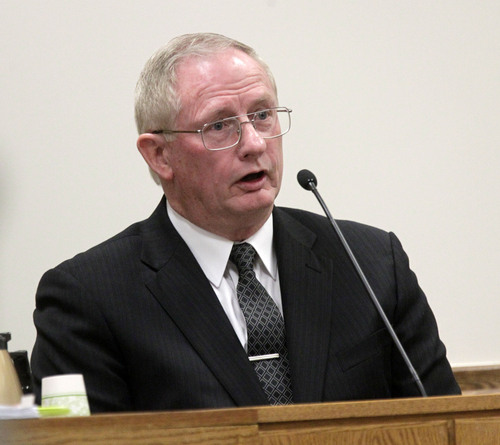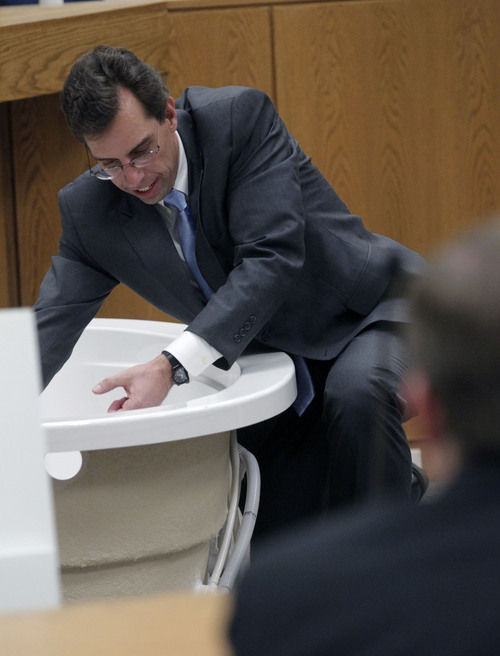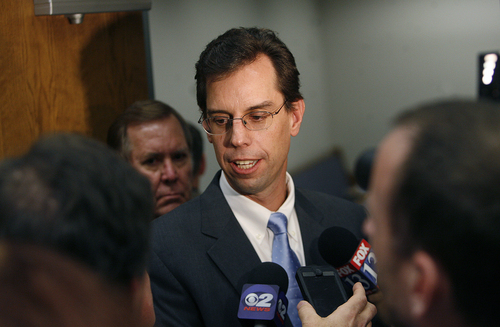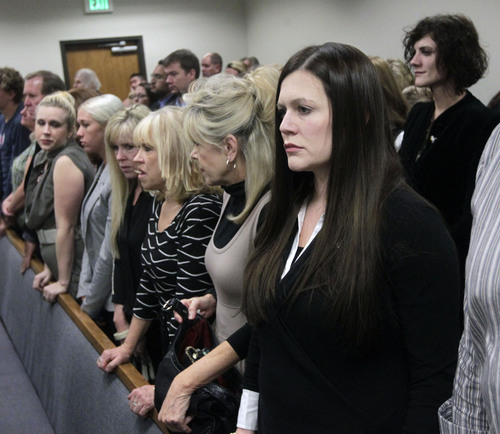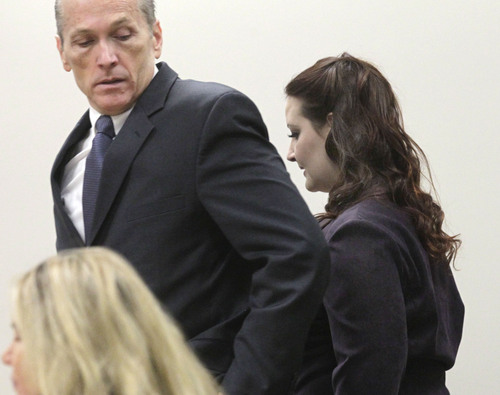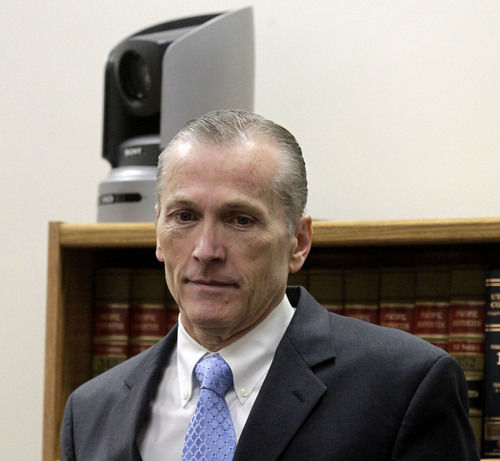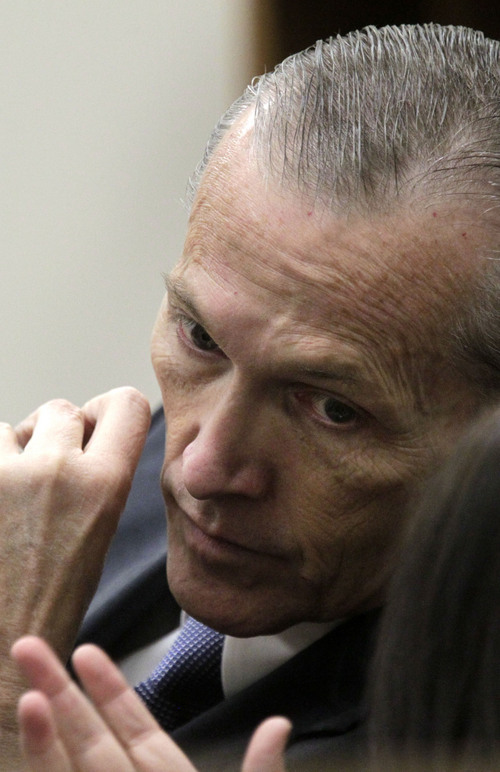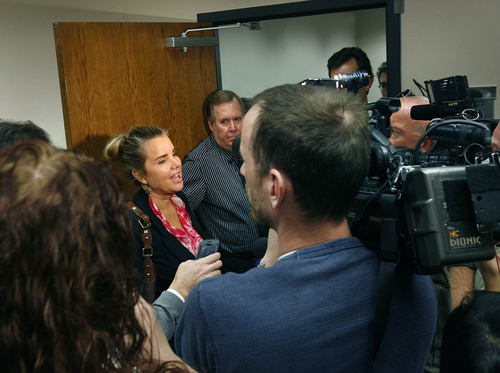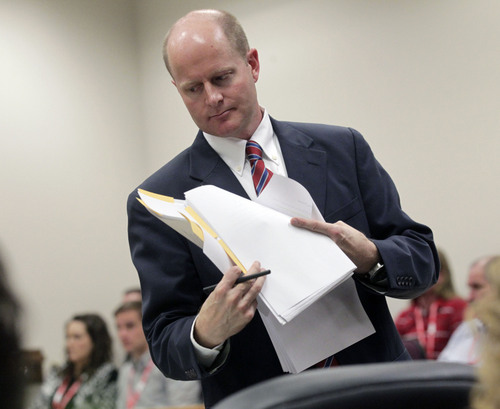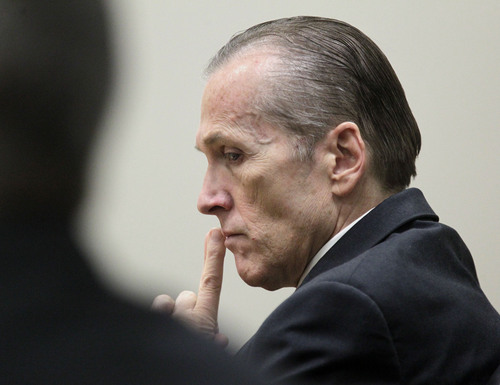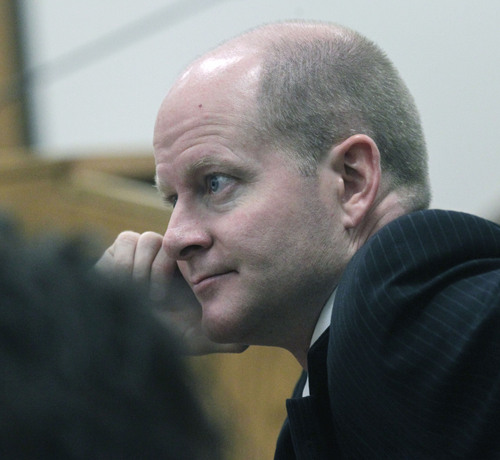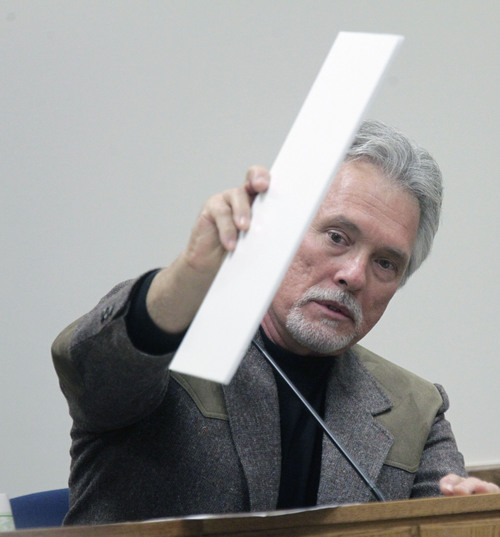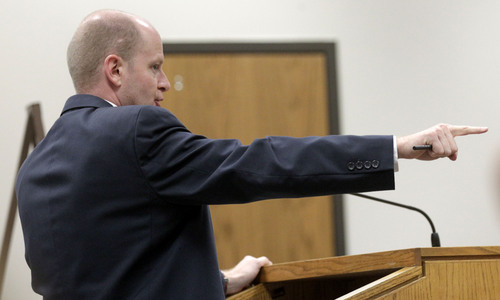This is an archived article that was published on sltrib.com in 2013, and information in the article may be outdated. It is provided only for personal research purposes and may not be reprinted.
Provo • The question of whether Martin MacNeill killed his wife at their Pleasant Grove home six years ago is now in the hands of jurors.
After four hours of closing arguments from prosecutors and defense attorneys, the jury left the courtroom to begin deliberations at 1:55 p.m.
Following 13 days of testimony, Deputy Utah County Attorney Chad Grunander on Friday began his closing argument by telling the 4th District Court jury: "The defendant carried out a cold and calculated plan to murder his wife."
"This case is dripping with motive," Grunander added.
Grunander said the drugs given to Michele MacNeill after her plastic surgery in April 2007 were Martin MacNeill's "cover to hide from the almost-perfect murder."
However, Grunander said the alleged murder was only "almost" perfect.
"Along the way, he left a number of clues that all point to him as a murderer," he told the jury.
But defense attorney Randall Spencer countered that there was no evidence presented by the state "that rises to the level of beyond a reasonable doubt."
Spencer pointed to wording in the Utah medical examiner's report indicating that drug toxicity "could potentially" or "may have had an effect" on the 50-year-old woman's death.
That equals reasonable doubt, Spencer argued.
"I feel like I could sit down right now, because the medical testimony is so clear," Spencer said about 20 minutes into his 90-minute closing argument.
Spencer says there was no evidence that anyone but Michele MacNeill, herself, gave her any medications on the morning she died, April 11, 2007.
"Even if [Martin MacNeill] did, the medications were low," Spencer said, adding the drug levels found in the woman's system were at therapeutic levels. "They were very, very low."
Michele MacNeill was found unconscious in her bathtub on April 11, 2007, by her 6-year-old daughter, Ada MacNeill.
Prosecutors allege Martin MacNeill gave Michele MacNeill a toxic combination of prescription medications. However, the state medical examiner's office has never ruled the woman's death a homicide.
They claim Martin MacNeill's affair with a younger woman — 37-year-old Gypsy Willis — was the motive for the alleged slaying. The 57-year-old former doctor is charged with first-degree felony murder, which is punishable by up to life in prison, and second-degree felony obstruction of justice, which carries a potential one-to-15-year sentence.
Grunander accused Willis — who at one point testified her relationship with Martin MacNeill was "casual" — of minimizing her feelings for him.
"Don't be fooled by her act," Grunander said.
Spencer asked the jury if it was "so surprising" that Martin MacNeill would move Willis into his home shortly after Michele's death.
"My client Martin MacNeill was living an alternative lifestyle," Spencer said. "Gypsy Willis was not his first affair."
Spencer said neither Alexis Somers nor Rachel MacNeill, two of Martin MacNeill's adult daughters who testified against him, are credible witnesses.
"Their facts get more and more slanted to make their father out to be a bad guy," Spencer said.
Prosecutors have made much of the fact that Martin MacNeill did not attempt to get his wife out of the bathtub, instead sending his young daughter to a neighbor's for help.
But Spencer said there was no room for Martin MacNeill to get into the tub because there was a 180-pound woman in it.
Spencer also pointed to Martin MacNeill's call to 911 as a measure of his innocence.
"He was hysterical," Spencer said. "He was seeking help. He wanted the 911 operator to send an ambulance."
Spencer said that during the likely time that "Michele fell in the tub," Martin MacNeill was at work, however prosecutors pointed in their closing arguments that there is a window of time — between 9:30 a.m. and 11 a.m. the day of Michele MacNeill's death — when Martin MacNeill's whereabouts are unknown.
Despite the defense's attempt to establish an alibi, Grunander said that Martin MacNeill had plenty of time to leave work and "take care of business" at home.
"Give Michele the drugs, fix her up a bath, get her in the tub, hold her head down a little while. Help her out," Grunander said, paraphrasing the testimony of an inmate who claims Martin MacNeill confessed the killing to him.
"There is a mountain of circumstantial evidence here, ladies and gentleman," Grunander told the jury.
Grunander added that there is also direct evidence, referencing the prison inmate testimonies.
"There is more than enough evidence to convict the defendant," he said. "He is guilty of murder and obstruction of justice."
"Do the right thing and convict Martin MacNeill ..." Grunander concluded.
Spencer closed his argument by asking that the jury find Martin MacNeill not guilty on both counts.
Outside of court, the MacNeills' daughter, Alexis Somers, said she was feeling "hopeful" about the case.
"We're very happy with the prosecution," Somers said. "They did a wonderful job. We're very grateful that my mom had a voice."
Grunander told members of the media that he was grateful the case is now in the jury's hands, but would not speculate as to what the verdict might be. Defense attorney Susanne Gustin said they feel confident in their case.
During the trial, the jury has heard from a number of witnesses, including Willis, several of Martin MacNeill's daughters — who believe he killed their mother — and two inmates who claimed the defendant confessed the alleged murder to them.
As Judge Derek Pullan instructed the jury on the law Friday morning, he noted that evidence of Martin MacNeill's affair was to be considered for "showing motive," and was not "character evidence."
The judge also noted that testimony from prison inmates must be "weighed with greater care," and that jurors can consider any deals or promises made in exchange for their cooperation.
Pullan told the jury that the prosecution and defense have agreed that Michele MacNeill did not commit suicide.
The defense called only four witnesses, including a former co-worker of Martin MacNeill and his child's kindergarten teacher, to back his alibi theory that he was at work at the time of Michele MacNeill's death and could not have killed her.
Defense attorneys also brought in an ergonomics expert, who told the jury it would have been difficult for Martin MacNeill to have lifted his wife from the bathtub by himself.
Martin MacNeill sent Ada MacNeill to a neighbor's house to get help, and eventually Michele MacNeill was pulled from the bathtub by a neighbor and Martin MacNeill.
Martin MacNeill did not take the witness stand in his own defense.
"Do not hold that choice against the defendant," the judge told jurors.
Before resting their case earlier Thursday, prosecutors recalled Martin MacNeill's former mistress, Willis, to the witness stand, and asked her to read a number of love letters the two exchanged in the fall of 2009 while they were incarcerated in federal prison for identity theft.
"You are worth everything I go through to get you back in my life," Willis read from a letter sent to her from Martin MacNeill.
Willis testified that although she and Martin MacNeill obtained a marriage license in July 2007, they never were officially married.
"Very shortly after 2009, we were indicted and separated," she testified, but said they had lived together and held themselves out to be married for several years before their arrests.
Martin MacNeill pleaded guilty to identity fraud and was sentenced in 2009 to spend four years in a federal prison for using his adopted daughter's Social Security number so that Willis could open bank accounts under a false name.
While Willis read a handful of letters sent to her from Martin MacNeill, the man appeared to become emotional, wiping a tear from his eye.
"Know that I love you and have loved you from the day we met," Willis read from Martin MacNeill's letter.
Willis testified that she never told him that, from her perspective, the relationship was over.
"I was so lonely," she testified about her time in prison. "I was thrilled out of my mind to get a letter."
But Willis also wrote back to Martin MacNeill, and read from one letter: "I have always loved you and always will."
After an autopsy in 2007, Michele MacNeill's manner of death was ruled "natural," the result of "chronic hypertension and myocarditis, which are capable of causing acute unexpected arrhythmia and sudden death."
But investigators say Martin MacNeill called the medical examiner multiple times and gave misleading information. In 2010, in a new investigative report, Chief Medical Examiner Todd Grey changed the cause of death to the combined effects of heart disease and drug toxicity. The manner of death was changed to "undetermined."
If the jury does not make a decision on Friday, it is possible they may return Saturday to continue deliberations.
The Tribune is carrying a live television feed from the courthouse and posting Twitter updates.
jmiller@sltrib.com
Twitter: @jm_miller


